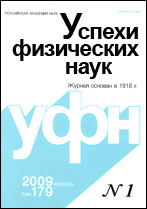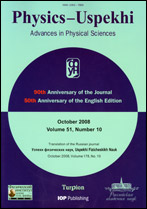|
This article is cited in 51 scientific papers (total in 51 papers)
REVIEWS OF TOPICAL PROBLEMS
Molecular energy transducers of the living cell. Proton ATP synthase: a rotating molecular motor
Yu. M. Romanovsky, A. N. Tikhonov
M. V. Lomonosov Moscow State University, Faculty of Physics, Moscow, Russian Federation
Abstract:
The free energy released upon the fermentative hydrolysis of adenosine triphosphate (ATP) is the main source of energy for functioning of the living cell and all multicellular organisms. The overwhelming majority of ATP molecules are formed by proton ATP syntheses, which are the smallest macromolecular electric motors in nature. This paper reviews the modern concepts of the molecular structure and functioning of the proton ATP synthase, and real-time biophysical experiments on the rotation of the ‘rotor’ of this macromolecular motor. Some mathematical models describing the operation of this nanosized macromolecular machine are described.
Received: March 26, 2010
Revised: April 23, 2010
Citation:
Yu. M. Romanovsky, A. N. Tikhonov, “Molecular energy transducers of the living cell. Proton ATP synthase: a rotating molecular motor”, UFN, 180:9 (2010), 931–956; Phys. Usp., 53:9 (2010), 893–914
Linking options:
https://www.mathnet.ru/eng/ufn2269 https://www.mathnet.ru/eng/ufn/v180/i9/p931
|


| Statistics & downloads: |
| Abstract page: | 971 | | Full-text PDF : | 360 | | References: | 73 | | First page: | 1 |
|





 Contact us:
Contact us: Terms of Use
Terms of Use
 Registration to the website
Registration to the website Logotypes
Logotypes








 Citation in format
Citation in format 
